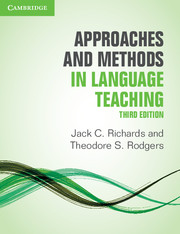Book contents
- Frontmatter
- Contents
- Acknowledgments
- Introduction to the third edition
- I Major trends in twentieth-century language teaching
- II Current approaches and methods
- III Alternative twentieth-century approaches and methods
- IV The teaching and learning environment
- Appendix: Comparison of approaches and methods
- Author index
- Subject index
13 - Cooperative Language Learning
Published online by Cambridge University Press: 08 April 2022
- Frontmatter
- Contents
- Acknowledgments
- Introduction to the third edition
- I Major trends in twentieth-century language teaching
- II Current approaches and methods
- III Alternative twentieth-century approaches and methods
- IV The teaching and learning environment
- Appendix: Comparison of approaches and methods
- Author index
- Subject index
Summary
Introduction
Language teaching is sometimes discussed as if it existed independently of the teach-ing of other subjects and of trends in teaching generally. However, like teachers in other areas of a school curriculum, language teachers too have to to create a posi-tive environment for learning in the classroom. They have to find ways of engaging students in their lessons, to use learning arrangements that encourage active student participation in lessons, to acknowledge the diversity of motivations and interests learners bring to the classroom, and to use strategies that enable the class to function as a cohesive group that collaborates to help make the lesson a positive learning expe-rience. In dealing with issues such as these, language teachers can learn much from considering approaches that have been used in mainstream education. Cooperative Language Learning (CLL) is one such example. CLL is part of a more general instruc-tional approach, known as Collaborative or Cooperative Learning (CL), which origi-nated in mainstream education and emphasizes peer support and coaching. CL is an approach to teaching that makes maximum use of cooperative activities involving pairs and small groups of learners in the classroom. It has been defined as follows:
Cooperative learning is group learning activity organized so that learning is dependent on the socially structured exchange of information between learners in groups and in which each learner is held accountable for his or her own learning and is motivated to increase the learning of others.
(Olsen and Kagan 1992: 8)Cooperative Learning has antecedents in proposals for peer-tutoring and peer-monitoring that go back hundreds of years and longer. The early-twentieth-century US educator John Dewey is usually credited with promoting the idea of building cooperation in learning into regu-lar classrooms on a regular and systematic basis (Rodgers 1988). It was more generally promoted and developed in the United States in the 1960s and 1970s as a response to the forced integration of public schools and has been substantially refined and developed since then. Educators were concerned that traditional models of classroom learning were teacher-fronted, fostered com-petition rather than cooperation, and favored majority students.
- Type
- Chapter
- Information
- Approaches and Methods in Language Teaching , pp. 244 - 258Publisher: Cambridge University PressPrint publication year: 2014

